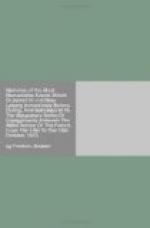singular enough that just at the very point where the
allies were reported to have sustained so signal a
defeat, that is to say, on their left wing, at Liebertwolkwitz,
the cannonade again became the most violent.
Fresh troops, with artillery, including a large body
of Polish cavalry, were seen hastening out by the Ranstaedt
gate towards Lindenau. Napoleon himself rode
with the king of Naples along the causeway to the
Kuhthurm (cow-tower), as it is called, probably to
observe how things were going on. The allies strove
to make themselves masters of the pass near Lindenau.
Their infantry had actually penetrated into the village,
but was driven back, and this was succeeded by a tremendous
fire of riflemen, which was near enough for us to
distinguish the discharge of every single piece.
I remarked on this occasion the incredible exertions
of the French voltigeurs, who defended a ditch
near the Kuhthurm, ran to and fro on the bank with
inconceivable agility, availed themselves of the protection
afforded by every tree and every hedge, and fired
away as briskly as though they had carried with them
the confederation of the Rhine, as their own property,
in their cartouch-boxes. Cannon-balls and shells
had fallen in the village itself, which was set on
fire in several places. Whether friend or enemy
had the advantage it was impossible to judge, on account
of the broken nature of the ground and the woods, behind
which the engagement was the hottest It was evident
that one party exerted itself as strenuously to defend
as the other did to take this important position.
The French retained it; therefore the prize of victory
in this instance must be adjudged to them. At
Breitenfeld, Lindenthal, and Wiederitsch, the fortune
of the day was different. There the lines of
the allies evidently advanced. The cannonade was
an infallible barometer. The French artillery
receded, and was already driven back so close upon
Gohlis and Eutritzsch, that the balls of their opponents
fell in both villages. Night drew on: the
vast field of battle became gradually enveloped in
darkness, and the horizon was now illumined by the
flashes of the guns alone, followed at long intervals
by the low thunder of the report. The battle
had lasted the whole day all round the city.
The church-clocks struck six; and, as if all parties
had unanimously agreed to suspend at this moment the
horrid work of slaughter, the last cannon-shot was
fired beyond Lindenau. The fire of small arms,
however, was yet kept up; but, as though the mortal
struggle became more and more faint, that too gradually
ceased. Nothing now was seen around the horizon
but one immense circle of many thousand watch-fires.
In all directions appeared blazing villages, and from
their number might be inferred the havoc occasioned
by this arduous day. Its effects were still more
plainly manifested when we descended into the streets.
Thousands of wounded had poured in at all the gates,
and every moment increased their numbers. Many




